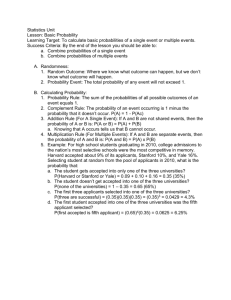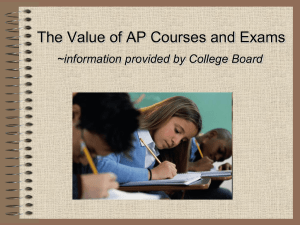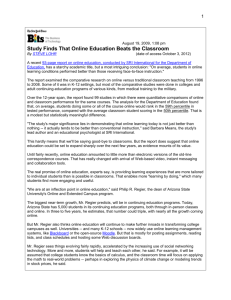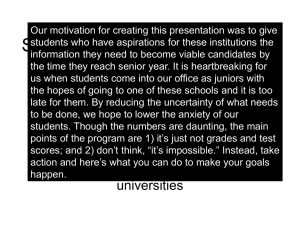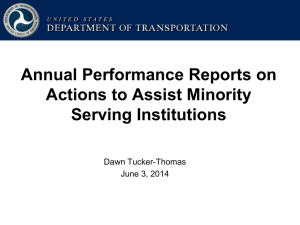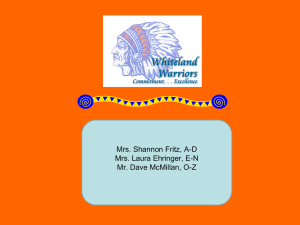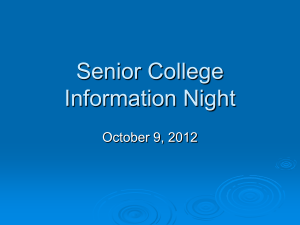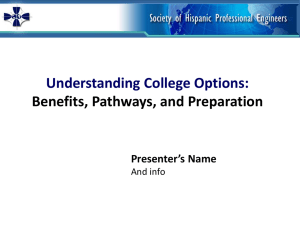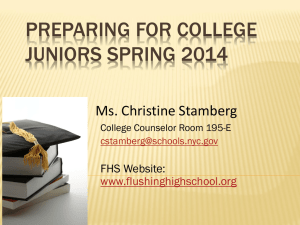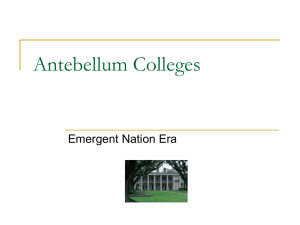attached - the International School of Belgrade
advertisement
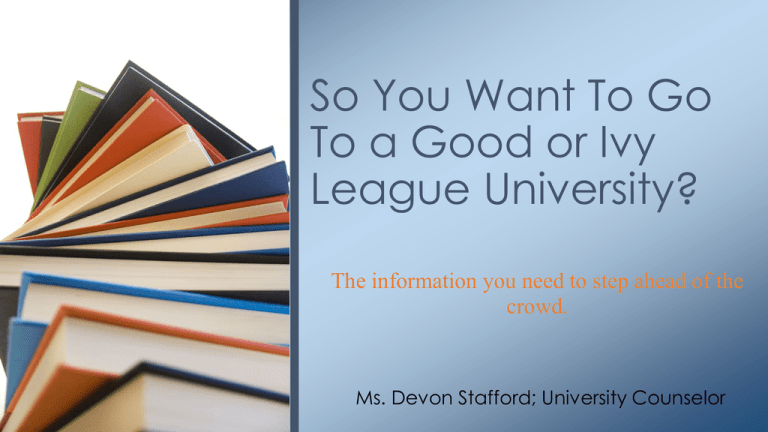
So You Want To Go To a Good or Ivy League University? The information you need to step ahead of the crowd. Ms. Devon Stafford; University Counselor Agenda • The future world • Rankings • What is the Ivy League? • Highly selective admissions • The Holistic review process • How to stand out from other applicants • Other considerations in admissions • Six case studies • How not to get in • Advice The Future World Rankings How Does Ranking Work? Categorized by their mission, The Carnegie classification, used extensively by higher education researchers. organize their data and to determine colleges' eligibility for grant money. • http://www.usnews.com/education/best-colleges/articles/2014/09/08/how-us-news-calculated-the2015-best-colleges-rankings?page=2 National Universities, • National Universities offer a full range of undergraduate majors, plus master's and doctoral programs, and emphasize faculty research. National Liberal Arts Colleges, • National Liberal Arts Colleges focus almost exclusively on undergraduate education. They award at least 50 percent of their degrees in the arts and sciences. Regional Universities • Regional Universities offer a broad scope of undergraduate degrees and some master's degree programs but few, if any, doctoral programs. Regional Colleges • Regional Colleges focus on undergraduate education but grant fewer than 50 percent of their degrees in liberal arts disciplines; this category also includes schools that have small bachelor's degree programs but primarily grant twoyear associate degrees. Regional Universities and Regional Colleges are further divided and ranked in four geographical groups: North, South, Midwest and West. The breakdown: • Undergraduate academic reputation (22.5 percent): • Retention (22.5 percent): • Faculty resources (20 percent): • Student selectivity (12.5 percent): • Financial resources (10 percent): • Graduation rate performance (7.5 percent): • Alumni giving rate (5 percent): What is the Ivy League? Athletic league comprised of highly selective universities • Brown University • Harvard University • Columbia University • Princeton University • Cornell University • University of Pennsylvania • Dartmouth College • Yale University Ivy Peers Peer institutions listed by Harvard University: Princeton Stanford Yale The Ivy League’s elite crew (institutions the Ivies listed as their peers, excluding other Ivies): Amherst Duke Johns Hopkins Northwestern Stanford Wash U Chicago Georgetown MIT Rice Rochester Williams The Top Ranked colleges and universities by peer selection: 1. Carleton College 2. Princeton University 3. Oberlin College 4. Stanford University 5. Yale University 6. Cornell University 7. Bowdoin College 8. Amherst College 9. Williams College 10. Swarthmore College 11. Middlebury College 12. University of Michigan, Ann Arbor 13. Pomona College 14. The University of Pennsylvania 15. Brown University 16. Harvard University 17. Wesleyan University 18. Columbia University 19. Massachusetts Institute of Technology (MIT) 20. University of Illinois at Urbana-Champaign 21. University of Wisconsin, Madison 22. Haverford College 23. Dartmouth College 24. Davidson College 25. Hamilton College 26. The University of Chicago 27. Grinnell College 28. Ohio State University 29. Kenyon College 30. University of California, Los Angeles (UCLA) Highly Selective Admissions • Grades & rigor of curriculum • Less than 20% admittance rate • Essays & standardized tests • Unique, interesting, likable • Extracurricular activities & leadership • Letters of Recommendation • Usually there is a Holistic reading Examples of Selective Schools: • Vassar 8000 aps for 650 spaces admit rate of 20%1300 outside of us apps • Vanderbilt : 30000 for 1600 spaces *4 different admission processes because they are in the colleges; 300 international • 86000 apps for UCLA 5700 freshman 1600 are from outside of state one app for all the UC scores so superscore SAT just highest sitting score read apps twice and they are ranked Academics is #1 • Key point is that being a strong academic is most important • Strong Grades of mostly 7’s in IB for sure • Robust overall GPA (grade Point Average) over 3 -3.5 years of HS • Strong SAT or ACT scores • Possible AP’s • Majority of apps fall into the border zone • Usually this is not what gets you into top selective schools Comparisons to Look at: SAT Scores Reading Math Writing 25% 75% 25% 75% 25% 75% Carnegie Mellon 630 730 680 780 640 740 Duke 660 750 690 780 670 770 Emory 640 740 670 760 650 750 Georgetown 640 750 650 750 - - Johns Hopkins 630 730 670 770 650 750 Northwestern 680 750 700 780 680 770 Notre Dame 660 750 680 770 - - Rice 650 750 680 780 650 760 Stanford 670 770 690 780 680 780 University of Chicago 700 790 700 780 - - Vanderbilt 680 770 700 780 670 760 Washington University 690 760 710 780 - - What are they Looking for? • It is a zero sum and only so many spaces • Wanting a broad diverse demographic • Students have to clear the academic hurdle • fit: for the school and what they are offering • fit for the student: (including retention) • Strong Extracurricular Engagement • Most institutions are need aware for International students • Are characteristics portrayed well in the full application profile? • Families want the formula but there is no formula IN BUILDING THE FRESHMAN CLASS: • a balance of interests, talents, backgrounds, experiences, perspectives and institutional priorities • what does the applicant have that we want? • rating system for each school these question frame the way they look at the student IN INDIVIDUALS: • talent and motivation • Engagement / Committment • impact • creativity • leadership Holistic Review • Unis needs multiple sources of information to determine if the student has the ability and character to be considered • goes beyond the academics, rigor and scores and place them in context • Extra Curricular Activities- How engagement and meaningful was the experience and the longevity of the experience beyond CAS • Teachers Recommendations • Essay is so important 3 BEST QUALITIES ACTIVITY • Write down three of your (or your child’s) best qualities on the sticky notes Either: • Now Circle one that is unique • Star one where you show leadership / initiative Share Essay: Common App Questions: • Some students have a background or story that is so central to their identity that they believe their application would be incomplete without it. If this sounds like you, then please share your story. • Recount an incident or time when you experienced failure. How did it affect you, and what lessons did you learn? • Reflect on a time when you challenged a belief or idea. What prompted you to act? Would you make the same decision again? • Describe a place or environment where you are perfectly content. What do you do or experience there, and why is it meaningful to you? • Discuss an accomplishment or event, formal or informal, that marked your transition from childhood to adulthood within your culture, community, or family. SCHOOL QUESTIONS: • NYU is global, urban, inspired, smart, connected, and bold. What can NYU offer you, and what can you offer NYU? (200-400 words) • Essay is so important: If you have two minutes to explain yourself to a stranger, how would you do it? Teacher Recommendations • Positive Behaviors and Attitudes shape the letters written • Create a relationship with your teachers/ coaches • Share what you are doing in your life • Be a student teachers want to write a reference for So What Now? How to stand out from other applicants • Grades & standardized test scores – that is what they are looking for • Geography – Atlanta, GA vs. Princeton, NJ • Unique academic interests or undersubscribed majors, demonstrated interest • Major • Regional, state, or national competitions & awards • Unique extracurricular activities • Essays • Strong Extended Essay in generated topics Other considerations in admissions • Legacy & 1st Generation • Gender • Ethnic diversity • Internationalism • Athletics recruitment • Musical or artistic talent Case study 1 - Harvard University • Ranked top 1% at a middle-tier public suburban HS • AP Calculus BC 5, World History 5, US History 5, European History 5, Geography 5, Economics 5, Spanish 4, Chemistry 4, Government 4 • SAT: MA 770, CR 790, WR 800; – SUBJECT TESTS: World History 750, European History 800, Math 800, Literature 740 • Interested in government & politics • Accepted at Stanford, Columbia, U Chicago, Duke, Rice, UNC Chapel Hill • Rejected from Yale Case Study 2 - Yale University • 4.00 GPA at an International School • All A’s in his A-level courses, continuing a second year in A-levels in 5 academic subjects • SAT: MA 760, CR 760, WR 770; • SAT Subject Tests: Math 800, Physics 800 • Interested in interdisciplinary studies between science, technology, history • Accepted at Notre Dame, UC Berkeley • Waitlisted at Penn • Rejected from Harvard, Princeton, MIT, Stanford, Dartmouth How NOT to get in • Do not visit colleges & demonstrate interest (interview) • Do not treat others well in HS (recommendation letters) • Do not come across as interesting or likable • Do not take initiative • Do not show academic focus • Do not become a leader and show leadership potential Advice from the Pros at Accept U • Start a personal file with activities – Include the number of hours per week & weeks per year, positions held • Get to know your school counselor & teachers • Do not be afraid to try & drop activities and look at sustaining activities • Start early in the process – 9 & 10 • Work hard in classes & grades • Write strong & interesting essays • Take initiative & create a club or organization • Prepare for interviews • Demonstrate interest • Study for & complete testing requirements early, meet deadlines Questions?
